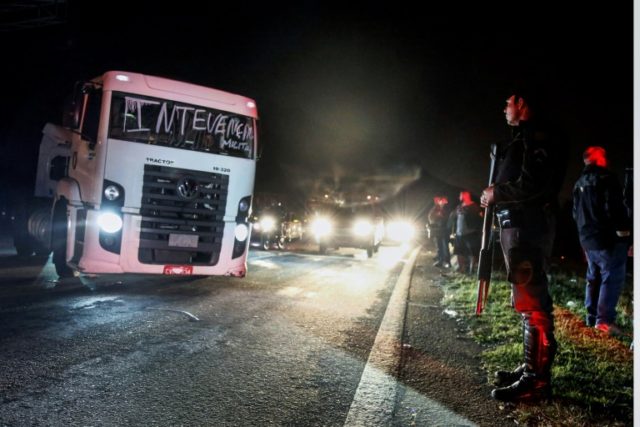Rio de Janeiro (AFP) – A truckers’ strike para
Post# of 52061

(92 US cents / then up to $1.01) a liter x 3.7854 = $3.82 a gallon

Rio de Janeiro (AFP) – A truckers’ strike paralyzing fuel, goods and food deliveries across Brazil entered an eighth day Monday, despite unpopular President Michel Temer’s decision to cave in to the drivers’ key demand for lower diesel costs.
More than 550 road blockages by truckers were mounted across 24 of the country’s 27 states, the federal highway police said, bringing Latin America’s biggest economy to its knees.
Shortages of aviation fuel paralyzed eight airports and essentially shut down the huge Santos seaport near Sao Paulo, which usually receives 10,000 trucks a day and now gets only a trickle.
Although there has been some improvement since the army was ordered to intervene Friday, with armed soldiers escorting fuel trucks on priority routes, enormous lines of cars were still forming at gas stations.
Many supermarkets around the country struggled to source fresh food. Producers reported having to slaughter stocks of chickens because they had no access to the feed, while others threw out thousands of liters of spoiled milk.
Hospitals in Rio de Janeiro and Sao Paulo had to cancel non-urgent surgeries and at least 13 states reported scrapping university classes. Adding to the disruption in Rio, the key BRT commuter system operated at only 22 percent capacity, while in Sao Paulo the bus system ran at 70 percent capacity.
After agreeing Sunday to slash diesel prices, the government proclaimed the crippling standoff over. But the failure of rank and file truckers to honor the deal struck by their union bosses has caught Temer by surprise.
Late Monday, he was still insisting on a way out, tweeting his “absolute conviction that this strike will end in one or two days.”
The truckers are angry over the rise in costs from 3.36 reais (92 US cents) a liter in January to 3.6 reais before the strike. On May 26, it hit 3.8 reais per liter.
After urgent negotiations with representatives of the truckers, Temer agreed to cut the diesel price by 0.46 reais a liter for 60 days.
That concession hammered the value in state-controlled oil major Petrobras, one of Brazil’s most dominant companies, which is due to face a strike by its own workers on Wednesday.
Shares dropped 14 percent Monday and 14 percent last Thursday, while the Ibovespa index in Sao Paulo closed 4.5 percent lower.
– Rejecting Temer –
Despite government assurances, truckers outside Rio vowed to continue their hard line.
Temer’s concession “was nothing. It’s only for two months and diesel is way too expensive. It should be reduced at least one real. People will stay here until the fight is over. It depends on the president,” said truck owner Yago Marquezine, 25.
The crisis has exposed the surprising fragility of the giant economy and put Temer’s lame duck administration on the defensive ahead of October general elections.
A poll by Ideia BigData found that 95 percent of Brazilians disapproved of his handling of the situation, even if 55 percent were agains the strike itself.
Temer took power in controversial circumstances in 2016, following the impeachment and removal from office of his leftist predecessor Dilma Rousseff for breaking budget rules.
The president’s market-friendly, center-right government then launched into sweeping austerity reforms that have been widely praised by investors as a bid to return Brazil to fiscal health, but proved hugely unpopular with ordinary Brazilians.
Approval ratings for Temer and his government are in the single digits, despite officials’ claims that their reforms have helped bring Brazil slowly out of a deep recession.
The current row over fuel is part of that wider conflict, with costs rising significantly since Temer’s politically sensitive decision in late 2016 to allow Petrobras autonomy over its pricing. The rise in world oil prices in recent weeks has also been a factor.
“This war doesn’t belong to the truckers, but to the Brazilian people!” chanted a crowd blockading the Duque de Caxias refinery outside Rio de Janeiro.
Brazil is a member of the G20 group of the world’s largest emerging and advanced economies. The first five days of the strike were estimated to have cost $2.8 billion, according to the daily Folha de Sao Paulo.
 (0)
(0) (0)
(0)